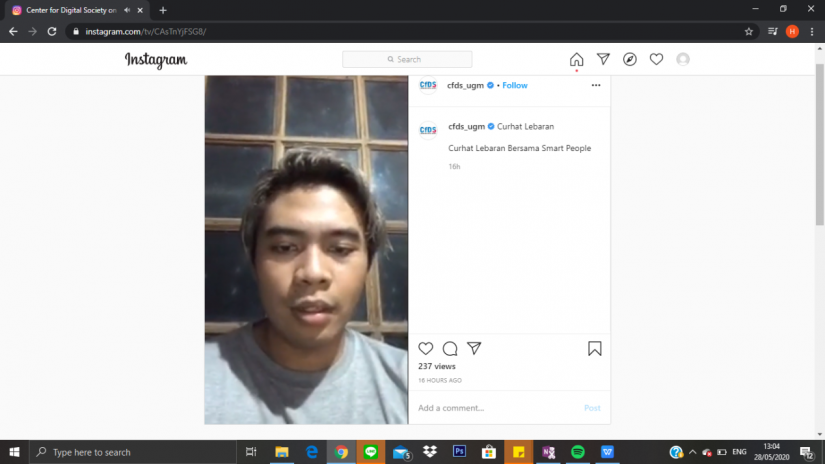
Yogyakarta, May 27th 2020—Center for Digital Society (CfDS) in Gadjah Mada University’s (UGM) Faculty of Social and Political Science is back with the third series of a discussion about the digital world called OPOSiT. In this OPOSiT, CfDS took the theme of Eid in the midst of a pandemic. It specifically discusses about the virtual eid that became a widespread phenomenon. Similar to the previous OPOSiT, this third session is open for everyone who wants to tell their stories. They can do that by asking for a permission to live stream alongside CfDS on their Instagram.
The first Eid story was told by Umar in Jakarta, specifically East Jakarta. Umar had a long trip through India before reaching Jakarta. He had to take a bus for three hours, a flight for six hours, and he had to be quarantined for three days. Fortunately, as soon as he arrived in Jakarta, he had a rapid test and swab test and it came out negative. Umar notices a clear difference between Jakarta’s and India’s condition. According to Umar, in Indonesia, including Jakarta, the policy implemented is pretty loose, so that the condition in Jakarta is quite crowded. Meanwhile, India implements their policy strictly. Besides that, Umar also feels that Indonesians do not have the necessary discipline, even in mundane things like mask usage. When Umar wants to buy himself a rice, he found that none of the seller used a mask. Umar said that the society should be careful in the midst of the pandemic, but they should not feel overly panicked.
The next participant who told a story is Rizka. Rizka chose to stay in Jakarta instead of her hometown even though she had a chance to go home when WFH was first implemented. That is why Rizka celebrated Eid online through Whatsapp. Rizka named the virtual Eid phenomenon as “zoom-keman”, a pun to the word “sungkeman” or shaking hands that also have to be conducted virtually. She also agreed with what Umar said about Jakarta. “Maybe there are a lot of big roads in Jakarta that looks abandoned, but when you look at the small streets, there are a lot of people there,” she said. Rizka saw the positive sides of this virtual Eid. She thinks that in this condition, reaching out is even easier to do, even with old friends that have not been called for a long time.
The story is continued by the third participant, Yaya, who also stayed in Jakarta. She couldn’t go home even if she already bought a ticket. Yaya also agreed to what Umar and Rizka said about how hectic Jakarta still is. That is what makes Yaya sad, because during her inability to go home, Jakartans chose to not care about the lockdown. When talking about video calls, Yaya’s story is quite similar to Rizka’s. This virtual Eid makes family that is faraway much closer, families that usually can’t come on Eid. In these moments, everyone can be connected through video call.
The story session was then continued with stories from three other participants. Other than stories about the last Eid, the host also gave an information that CfDS will still hold events virtually, shown through the online discussions and live streams that encourages participation from attenders. The OPOSiT live stream ended on 8 pm. The recording of the live stream can be watched through CfDS’s Instagram IGTV.
